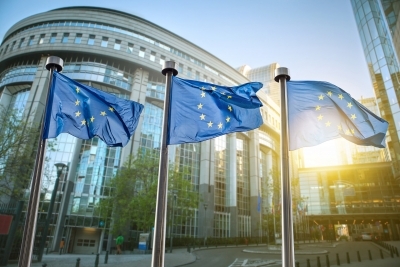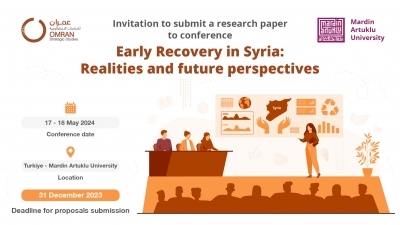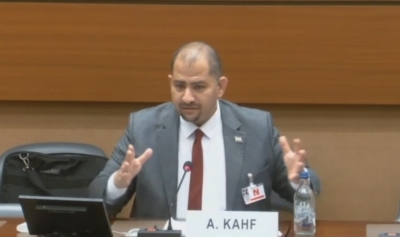General Summary
This report provides an overview of the key events in Syria during the month of January 2024, focusing on political, security, and economic developments. It examines the developments at different levels.
· Politically, efforts to normalize relations with the Syrian regime continue, with Arab nations offering more incentives for the regime to address their demands. Despite these efforts, the 21st round of Astana peace talks saw no significant progress.
· Security, Syria remains a battleground with ongoing conflicts between Iran and its militias versus the U.S. and Israel. The Syrian-Jordanian border faces a growing drug smuggling crisis Turkey has intensified its military operations in northeastern Syria, expanding its targets beyond military and security installations to also include infrastructure and service facilities managed by the “Autonomous Administration,” as well as oil and gas fields.
· Economically, the Syrian regime persisted in leveraging available opportunities to bolster its treasury through the augmentation of fuel prices and the elevation of service fees and taxes. Concurrently, the northwestern regions of Syria observed initiatives aimed at enhancing the economic landscape.
The Path to Normalization: Navigating Acceptance and Resistance
In a strategic move to mitigate its global isolation, the Syrian regime's Deputy Foreign Minister participated in the Non-Aligned Countries' summit in Kampala, Uganda. During this event, the Syrian delegation engaged in bilateral discussions with representatives from North Korea, Venezuela, Russia, Cuba, and the Republic of Guyana.
As part of its efforts to bolster ties with Arab nations, the regime named its ambassador to Tunisia, reciprocated by the United Arab Emirates appointing its ambassador to Damascus. Despite this Arab rapprochement, Western nations remain skeptical about the benefits of normalizing relations with the Regime government. Brigitte Cormi, France's Special Envoy for Syria, highlighted the regime's stubbornness as a significant barrier to normalization efforts, urging the international community not to sideline the Syrian crisis amidst other global concerns. Similarly, the U.S. Deputy Assistant Secretary of State labeled the Assad regime a primary hurdle to political progress in Syria, reaffirming U.S. support for UN Resolution No. 2254 and stating that the U.S. would neither normalize relations with Damascus nor lift sanctions without a political resolution.
In another development, the 21st round of Astana talks concluded without significant advancements in key issues. However, the guarantor states—Turkey, Russia, and Iran—agreed to rejuvenate the Constitutional Committee's negotiations and uphold the military de-escalation in Idlib, despite failing to foster normalization between Turkey and the Syrian regime.
In Northwestern Syria, the Salvation Government announced the creation of the General Directorate of Works and Roads, alongside urban planning initiatives for several towns and cities. On the humanitarian file, the United Nations and the Syrian regime agreed to extend the delivery of humanitarian aid through the “Bab al-Hawa” crossing for an additional six months, starting from January 13, 2024, to July 13, 2024. This extension also includes aid delivery through the Bab Al-Salama and Al-Rai crossings until February 13, 2024.
In Northeastern Syria, the Autonomous Administration of northern and eastern regions has implemented revisions to the Media Law, aligning it with the most recent iteration of the Social Contract introduced at the previous year's end. Concurrently, it initiated the establishment of the High Electoral Commission, tasked with developing a preliminary electoral law framework. This step is in anticipation of conducting comprehensive elections in the forthcoming phase within its jurisdiction, addressing the ongoing legitimacy crisis that impedes its claim to represent the northeastern Syrian populace effectively. In addition, the Autonomous Administration has offered a general amnesty to those evading compulsory military service. Furthermore, it has shown a greater willingness to initiate conversations with stakeholders both within the country and on the global stage. Mahmoud al-Muslat, the co-chair of the Syrian Democratic Council, has openly expressed his readiness to engage in discussions with all interested parties, from local entities to international ones, Turkey included.
The Escalating Drug Crisis in Syria: Implications and International Reactions
The Syrian regime, has undertaken a series of unannounced reforms within its security and intelligence sectors, including the reassignment of Ali Mamlouk from his role as the head of the National Security Bureau to a presidential advisor on national security affairs. Major General Kifah al-Mulhim has been appointed as the new head of the National Security Bureau. Additionally, /54/ retired generals have been reinstated to contribute to the restructuring of the security apparatus, aiming to enhance its efficiency and direct coordination under the leadership of Bashar al-Assad. These reforms, largely seen as symbolic, are part of efforts to appease Russian demands and facilitate broader normalization with Arab and Western nations through internal adjustments.
Israeli forces, conducted multiple strikes against sites associated with Iranian militias in Syria, leading to the death of four commanders from the Islamic Revolutionary Guard Corps (IRGC), including high-ranking officials from the Quds Force. Additionally, the Israeli forces assassinated Hassan Okasha, a Hamas leader implicated in launching rockets from Syrian territory towards the the Israeli-occupied Golan Heights. Concurrently, the so-called Islamic Resistance in Iraq kept on targeting U.S. bases across several locations in northeastern Syria, including al-Omar, Rmelan, al-Malikiyah, al-Shadadi, and the U.S. base in Himo town.
In Southern Syria, in response to the ongoing conflict in Gaza and its repercussions for Syria, Russia has established two military positions in al-Quneitra and initiated aerial patrols along the “Bravo line,” the demarcation line between Syria and the Israeli-occupied Golan Heights. This move aims to prevent further escalations and monitor provocative activities along the border, potentially mitigating broader confrontations in the Golan region.
Jordan has intensified its efforts against drug trafficking from Syria, executing four airstrikes on suspected drug trafficking locations in al-Suwayda, which regrettably resulted in civilian casualties. Jordanian military forces also engaged with armed groups involved in drug trafficking within the free zone east of Sweid. The Men of Dignity movement (Rijal al-Karama movement), a prominent military faction in al-Suwayda, proposed a nine-point initiative to Jordan, emphasizing the need to prevent civilian casualties during these operations, in another development, Sheikh Hikmat al-Hijri, a leader within “al-Druze al-Muwahhidun” sect and an opponent of the Assad regime, announced his support for the ongoing Jordanian military operations against drug traffickers. Amidst these developments, the Syrian regime and the Jordanian government have exchanged accusations, each blaming the other for jeopardizing border security. While Daraa continues to face security challenges due to the presence of various military and security groups, leading to ongoing violence, including targeted killings. A significant incident was the assassination of the head of the regime's criminal security center in Izraa. Additionally, the area has witnessed clashes between Ex-Opposition groups and ISIS cells, resulting in the death of Osama Shehadeh al-Azizi, identified as ISIS's governor of Hauran.
Among all these developments, ISIS has intensified its activities, announcing a campaign/raid titled “and kill them where you educated them”, after the announcement they executed 34 attacks across Syria in January 2024, included 22 in Deir Ezzor, 4 in Aleppo, 3 in Homs, 3 in Hasakah, and 2 in Raqqa. The increase in ISIS attacks reflects the growing instability and tension in the region, further aggravated by assaults from Iran-supported militias on U.S. bases. This surge in violence also suggests that ISIS has managed to regain some of its military strength, enabling it to launch operations across various locations.
In Idlib, ongoing assaults by regime forces and Iranian militias continue, with heavy artillery strikes on various cities and towns resulting in the death of 40 civilians, predominantly women and children, and injuring many others. A notable escalation occurred when Iran's Islamic Revolutionary Guard Corps (IRGC) fired a ballistic missile from Iranian soil, targeting a medical facility in the village of Talteta. In retaliation, the Turkish military engaged regime positions along the Saraqib front, responding to attacks on a Turkish base in Ibzimu.
Meanwhile, The Turkish Ministry of Defense reported neutralizing 14 members of the People's Protection Units (YPG) accused of initiating aggressive actions in the Euphrates Shield zone. This was in retaliation to the Syrian Democratic Forces (SDF) shelling of a Turkish base in Kaljibrin, in addition, TSK drones conducted over 70 strikes on a variety of targets, including checkpoints, facilities, oil fields, and infrastructure across the region, such as the Swedish power plant. These attacks resulted in casualties among the SDF, triggered a fuel shortage, and led to a comprehensive power outage lasting several days.
In Deir Ezzor, the SDF have reopened al-Ashara crossing, bridging territories under their control with the Syrian regime held-areas. This move aims to curtail smuggling routes exploited by Iranian-backed militias to infiltrate the SDF held-areas and execute attacks on U.S. military bases.
Syrian Regime's Policies Exacerbate the Livelihood Crisis
The Syrian regime, has adjusted the foreign remittance dollar exchange rate from /12,500/ to /13,000/ SYP, aiming to boost incoming remittances and stabilize foreign exchange reserves. Concurrently, the Ministry of Internal Trade implemented a significant fuel price hike, with diesel prices for vehicles soaring by nearly 500% to reach /11,880/ SYP. This move has led to heightened inflation and a substantial 70% surge in the cost of essential goods and materials in Damascus.
In another development, the regime has enacted measures to increase service fees and taxes, including a 200% hike in passport fees and elevated registration costs for Sharia education certificates. Additionally, a new tax on cement production is anticipated to further escalate the prices of goods and services, adversely affecting the living standards of citizens, business owners, and industrialists. This economic pressure is expected to exacerbate migration drivers and potentially trigger a new refugee wave.
In the realm of international economic engagement, the Syrian-Iranian Chamber of Commerce has ratified its annual agenda, which encompasses the formation of Iranian investment entities within Syria. The regime is also exploring economic opportunities in South America, evidenced by the organization of a Syrian trade delegation to Brazil aimed at revitalizing previously established agreements.
Striving for Early Recovery: Efforts and Challenges
In the Opposition Held-Areas, the inaugural investment conference took place in the city of al-Ra'i, marking a significant effort to enhance the economic landscape and create employment opportunities. Complementing these economic initiatives, the Syrian Civil Defense Organization launched a health program across /33/ schools in the Idlib and Aleppo regions. Additionally, the Syrian American Medical Society (SAMS) initiated the “Sams Medical City” project in Idlib, in collaboration with the Syrian Forum and the Syrian Civil Defense Organization. This project represents a significant advancement in healthcare provision for northwestern Syria, aiming to substantially improve medical services in the area.
The financial ecosystem in Idlib faced a setback when numerous exchange and remittance offices halted operations following the bankruptcy of the “al-Rais” Company for Remittances and Exchange. This event led to substantial financial losses, estimated at around three million dollars, and resulted in a dramatic increase in remittance fees, restricting transactions to a limited number of entities and companies.
In the SDF Held-Areas, the Autonomous Administration implemented new annual taxes on commercial and pharmaceutical businesses, a move that has been met with considerable opposition from the affected merchants. In an effort to regulate the economy, a series of measures concerning both foreign and local currencies were introduced, including significant regulations on the licensing of banking institutions. These financial and tax-related decisions are expected to exacerbate the cost of living for residents, heightening tensions between the Autonomous Administration and local Arab tribes. The region is already grappling with a severe fuel shortage, lacking essential supplies of diesel, gasoline, and gas, which threatens to increase costs in agriculture and production, further straining the economic stability of the area.




